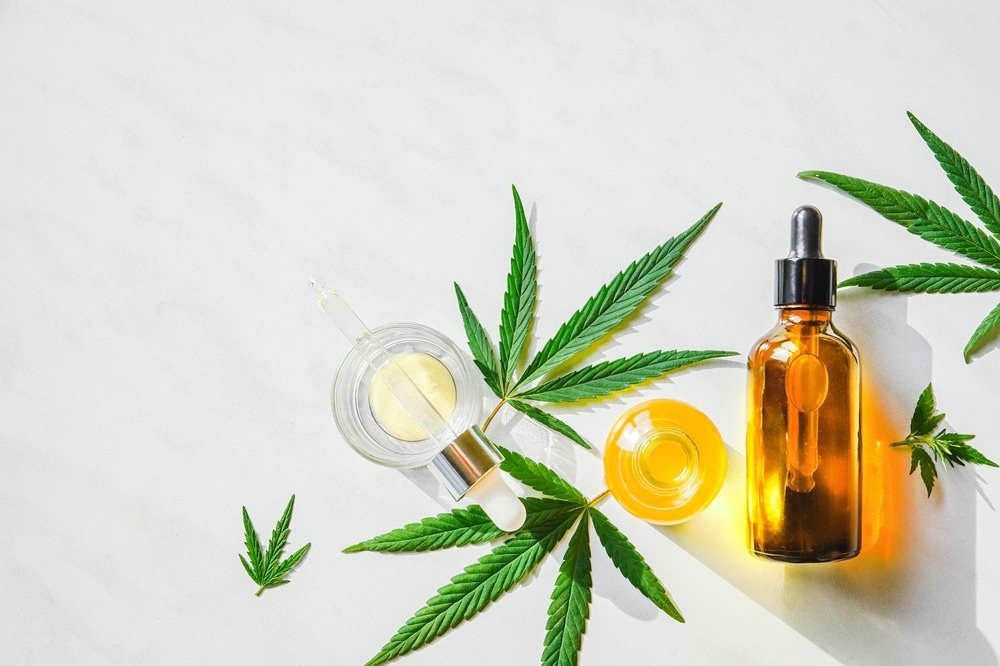Cannabis is a psychedelic drug being increasingly legalized throughout the western world for medicinal and recreational purposes. Simultaneously, more potent drug preparations are being used in terms of their ∆9-tetrahydrocannabinol (THC) concentrations. THC is known to cause acute adverse effects and may result in long-term impairments when consistently used in high doses.

Study: Does cannabidiol make cannabis safer? A randomised, double-blind, cross-over trial of cannabis with four different CBD:THC ratios. Image Credit: IRA_EVVA / Shutterstock.com
Introduction
Cannabis users who have a low frequency of use have been reported to develop acute loss of memory and attention with high-THC cannabis preparations, along with psychotic symptoms. Over more extended periods of use, this could result in a greater likelihood of psychosis and developing cannabis use disorder.
As a chemical, CBD fails to affect cognitive functions and prevent the development of psychosis, with the risk of both being lower among users who smoke high-CBD cannabis, irrespective of their frequency of use. When CBD is first given, followed by THC, the memory and psychotic effects of THC have been reported to be mitigated in light users, but not with frequent use.
About the study
The current study examines the acute effects of cannabis at four different dosages of CBD in relation to THC. These CBD:THC ratios of 0:1, 1:1, 2:1, and 3:1 were tested in 46 healthy volunteers between 21 and 50 years of age who infrequently used cannabis. More specifically, the study participants had used the drug once or more in the past but not more than once a week during the last year.
None of the study participants had a substance use disorder or used synthetic cannabinoids.
The current study followed a double-blind randomized pattern using vaporized cannabis containing 10 mg THC and either 0, 10, 20, or 30 mg of CBD. The researchers assessed their effects on cognition regarding verbal recall using the Hopkins Verbal Learning Task. Simultaneously, psychotic symptoms were assessed using the Positive and Negative Syndrome Scale (PANSS) positive subscale.
The study participants first inhaled cannabis, following which they completed a set of cognitive tasks and were assessed for pleasurable effects based on their enjoyment of chocolate and music compared to baseline. The participants were then asked to purchase something from a hospital shop.
After this, the study participants were given time for the drug’s effects to wear off. Finally, they completed questionnaires to describe their psychological experiences, including persecutory thoughts, self-assessment of psychotic thoughts, and a visual analog scale for their subjective feelings following drug use.
Finally, they completed an interview to apply the PANSS-P.
What did the study show?
In all cases, peak THC and THC metabolite levels in blood were similar. However, peak CBD levels rose with the THC:CBD ratio.
THC exerted the same effects at all ratios, with impaired immediate and delayed verbal recall as compared to baseline, irrespective of the presence or ratio of CBD. Herein, THC induced higher rates of intrusive psychotic-like thoughts, both immediate and delayed.
Positive psychotic effects were significantly greater following inhalation, with half of the total participants showing an increase in their PANSS-P scores by three points compared to baseline at all ratios and without significant differences between ratios. Psychotic thoughts also increased across the cohort without any difference between different ratios.
However, persecutory thoughts did not increase with the use of the drug at any ratio.
Other tests showed that pleasurable effects or euphoria were evenly distributed, irrespective of the CBD:THC ratio. In addition, the euphoric feeling did not correlate with the plasma levels of either compound.
While heart rate increased after inhalation, there were no changes in blood pressure or temperature. However, coughing during inhalation was significantly greater with the CBD dose. Moreover, with longer periods required to inhale the full dose, peak concentrations were reduced at higher CBD:THC ratios.
What are the implications?
The co-administration of CBD with THC had no effect on the induction of either cognitive impairments or psychotic symptoms following cannabis use.”
Furthermore, the presence of CBD at increasing ratios did not change the subjective feeling of being high or the pleasurable effects of THC.
The current study is important, as it measured these effects using CBD:THC ratios usually found in recreational or medicinal cannabis. Unfortunately several participants dropped out at the first visit, more so with the 3:1 ratio, due to the intolerably unpleasant effects of the drug.
The remaining study participants may have been less sensitive to cannabis, especially CBD, but still registered significant changes in cognitive and psychological tests.
The primary observation that CBD does not modulate THC's psychotic or cognitive effects corroborates earlier studies; however, two previous studies reported a weakening of such effects with CBD. These used larger doses of CBD that are often greater than those usually present in medicinal or recreational cannabis. Such doses may require non-inhalation routes of administration.
Conversely, one previous study reported reduced risk with higher CBD:THC ratios which may be explained by the fact that plants that produce cannabis with higher ratios do so by producing more CBD at the expense of THC, as both come from the same precursor compound.
The purported reduced risk from using high CBD varieties may thus not be an effect of the high CBD content, but due to the relatively low THC content.”
The study findings show that CBD offers no protection against the acute effects of THC; however, its potential long-term protection remains to be studied. Meanwhile, it appears that CBD content is not a critical factor in regulating or defining cannabis formulations and may not alleviate the adverse effects of THC.
Journal reference:
- Englund, A., Oliver, D., Chesney, E., et al. (2022). Does cannabidiol make cannabis safer? A randomised, double-blind, cross-over trial of cannabis with four different CBD:THC ratios. Neuropsychopharmacology. doi:10.1038/s41386-022-01478-z.